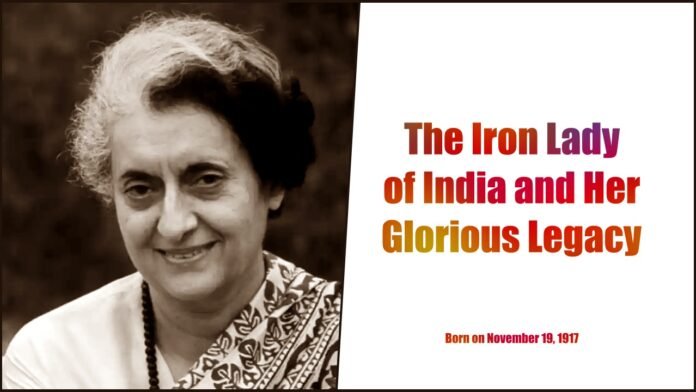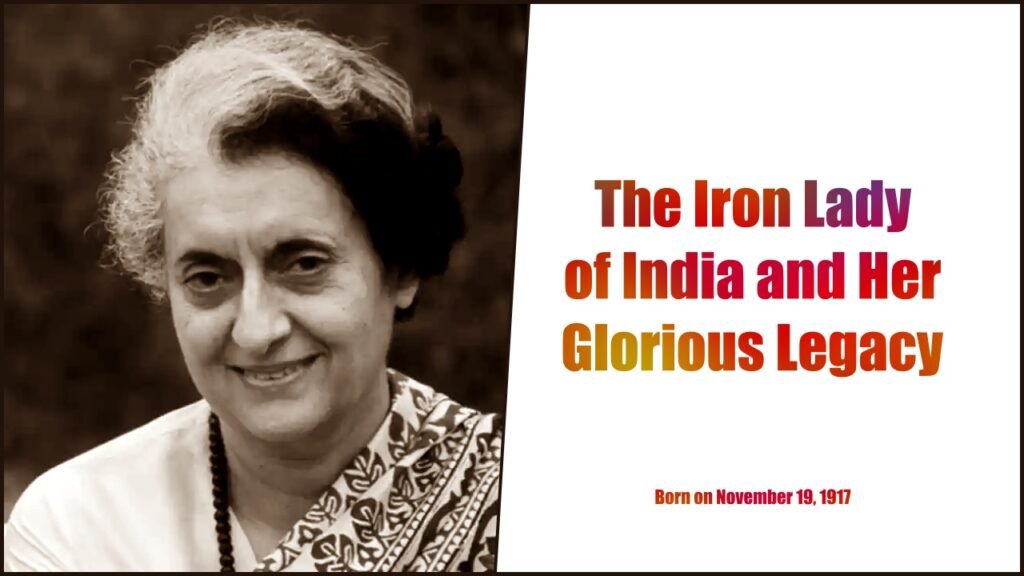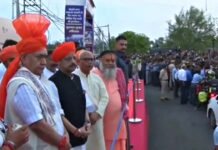
Indira Gandhi was born on November 19, 1917, in Allahabad, Uttar Pradesh. She was the daughter of Jawaharlal Nehru, the first Prime Minister of independent India, and Kamala Nehru, a freedom fighter and social activist. She grew up in a political environment and was influenced by her father’s ideals and vision. She joined the Indian National Congress in 1938 and participated in the Quit India Movement in 1942. She married Feroze Gandhi, a journalist and politician, in 1942 and had two sons, Rajiv and Sanjay.
Indira Gandhi became the Prime Minister of India in 1966, after the death of Lal Bahadur Shastri. She was the first and only woman to hold this position in India. She faced many challenges and crises during her tenure, such as the 1965 war with Pakistan, the 1971 war with Pakistan that led to the creation of Bangladesh, the 1974 nuclear test, the 1975 Emergency, the 1980 return to power, and the 1984 Operation Blue Star. She also initiated many reforms and policies that shaped the economic, social, and political development of India. Some of her notable achievements are:
- She launched the Green Revolution in 1967, which increased the agricultural production and food security of India. She also supported the White Revolution, which boosted the dairy sector and cooperatives. She was awarded the Bharat Ratna, India’s highest civilian honor, in 1972 for her contribution to the Green Revolution.
- She nationalized 14 major private banks in 1969, which expanded the banking services to the rural and poor sections of the society. She also nationalized the coal, steel, copper, and oil industries, and introduced the Monopolies and Restrictive Trade Practices Act, to curb the concentration of economic power and promote social justice.
- She abolished the privy purses and privileges of the former rulers of the princely states in 1971, which ended the feudal system and integrated the states into the Indian Union. She also amended the Constitution to give more powers to the central government and the Prime Minister.
- She led India to a decisive victory in the 1971 war with Pakistan, which resulted in the liberation of Bangladesh. She signed the Shimla Agreement with Zulfikar Ali Bhutto, the Prime Minister of Pakistan, in 1972, which established peace and cooperation between the two countries. She also recognized the state of Israel and established diplomatic relations with it in 1982.
- She conducted the first nuclear test in Pokhran, Rajasthan, in 1974, which made India a nuclear power and enhanced its security and prestige. The test was code-named Smiling Buddha and was carried out in secrecy and in defiance of international pressure.
- She launched the Garibi Hatao (Remove Poverty) campaign in 1971, which aimed at improving the living standards of the poor and marginalized sections of society. She implemented various schemes and programs, such as the nationalization of banks, the Minimum Wages Act, the Land Ceiling Act, the Twenty Point Program, and the Integrated Rural Development Program, to achieve this goal.
- She supported the Indian Space Program and the development of science and technology in the country. She inaugurated the first Indian satellite, Aryabhata, in 1975, and the first Indian-built rocket, SLV-3, in 1980. She also sent the first Indian astronaut, Rakesh Sharma, to space in 1984, aboard the Soviet spacecraft Soyuz T-11.
Indira Gandhi was a visionary leader and a charismatic personality, who left an indelible mark on the history of India. She was admired and respected by many people around the world, and received several awards and honors, such as the Hero of the Soviet Union, the Lenin Peace Prize, the Jawaharlal Nehru Award, and the Bharat Ratna. She was also criticized and opposed by many people, who accused her of being authoritarian, corrupt, and communal. She faced many controversies and scandals, such as the Emergency, the Sanjay Gandhi case, the Shah Commission, Operation Blue Star, and the Sikh riots. She was assassinated by her own bodyguards, Satwant Singh and Beant Singh, on October 31, 1984, at her residence in New Delhi. She was cremated at Shakti Sthal, where a memorial was built in her honor.

Indira Gandhi was a remarkable woman and a powerful leader, who shaped the destiny of India and influenced the world. She was a symbol of courage, determination, and resilience, who faced many challenges and overcame many obstacles. She was a champion of democracy, secularism, and socialism, who fought for the rights and dignity of the people. She was a daughter of India, who loved her country and sacrificed her life for it. She was, in the words of Atal Bihari Vajpayee, “a woman of the millennium, who transcended the boundaries of time”. On her birthday, we remember her achievements and legacy and pay tribute to her spirit and vision.









































